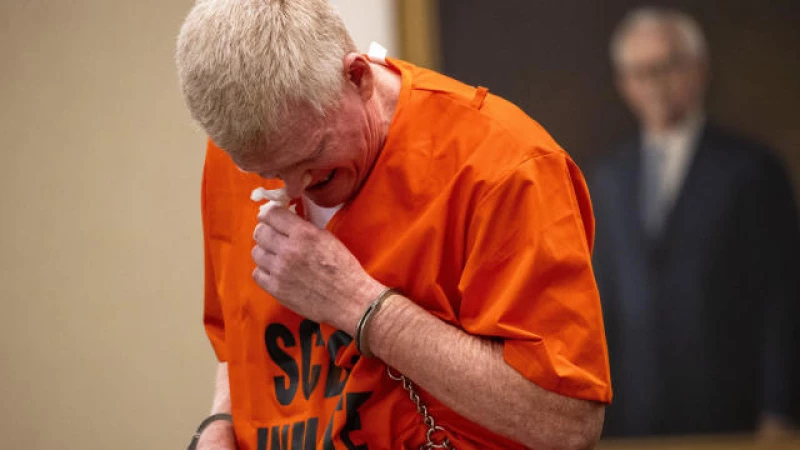Behold, in what may be his final appearance, Alex Murdaugh made his way into a courtroom in South Carolina, this time clad in a prison jumpsuit rather than his usual suit. Here, he was handed a 40-year sentence in federal prison.
This time, Murdaugh faced consequences in federal court for his actions of misappropriating funds from clients and his law firm. The 55-year-old former lawyer, already serving a life sentence without the possibility of parole for murdering his wife and son, now faces further repercussions.
This additional 40-year sentence serves as an extra layer of punishment. In addition to his life sentence, Murdaugh had previously pleaded guilty and received a 27-year prison term in state court for financial crimes. The federal sentence will coincide with his state prison term, and he is likely to serve the full 40 years should his murder convictions be overturned on appeal.
U.S. District Judge Richard Gergel expressed his decision to impose a stricter punishment on Murdaugh due to his theft from the most vulnerable individuals, including a client who became a quadriplegic after an accident, a state trooper injured on duty, and a trust fund designated for children whose parents perished in a crash.
"They placed all their problems and all their hopes on Mr. Murdaugh and it is from those people he abused and stole. It is a difficult set of actions to understand," remarked Gergel.
The 22 federal charges mark the conclusion of legal actions against Murdaugh, once a prominent attorney in Hampton County known for brokering multimillion-dollar settlements. His family had a longstanding legacy in the county, with members serving as elected prosecutors and operating the premier law firm for almost a century.
Additionally, Murdaugh is required to pay back nearly $9 million in restitution.
Prosecutors are pushing for a harsher penalty, suspecting that Murdaugh is withholding information regarding the whereabouts of $6 million he embezzled and a potential involvement of an unidentified attorney in his illicit activities.
One of Murdaugh's major schemes involved the sons of Gloria Satterfield, his longtime housekeeper who tragically passed away in a household accident. Promising to support Satterfield's family, Murdaugh collaborated with a lawyer associate who later pleaded guilty to a plot to misappropriate $4 million from a wrongful death settlement with the family's insurance provider.
During his sentencing, Murdaugh admitted to taking settlement money from or inflating fees and expenses for more than two dozen clients, totaling nearly $1.3 million. He expressed remorse, stating that he felt "guilt, sorrow, shame, embarrassment, humiliation."
Similar to his state sentencing, Murdaugh offered to meet with his victims to hear their thoughts and "more closely inspect my sincerity." He struggled to find the right words to convey the magnitude of his feelings about his actions.
Blaming his crimes on a nearly two-decade addiction to opioids, Murdaugh mentioned that he has been clean for 937 days. However, the judge, Gergel, dismissed this explanation, stating that no truly impaired person could have executed such complex financial transactions over such a long period.
In addition to his financial crimes, Murdaugh was previously convicted of killing his son Paul and wife Maggie, although he maintains his innocence in these deaths and testified in his own defense.
Evidence at the trial included bloody crime scene images, Murdaugh's interviews with investigators, details about Maggie Murdaugh's autopsy, cell phone evidence and testimony from a forensic engineer.
There will be years of appeals in the murder cases. In January, a South Carolina judge denied his bid for a new trial after his defense team accused a clerk of court with tampering with a jury.
The case has captivated true crime fans, spawning dozens of podcast episodes and thousands of social media posts. It continued its odd twists in the days before Monday's sentencing hearing.
Lawyers for Murdaugh said an FBI agent who conducted a polygraph test asked Murdaugh if he could keep a secret, then confided he had just examined notorious Dutch killer Joran van der Sloot.
Murdaugh flunked that polygraph test, according to prosecutors who want a harsher sentence. Each of the 22 counts Murdaugh pleaded guilty to in federal court carried a minimum of 20 years in prison. Some carry a 30-year maximum.
The defense said the alleged odd behavior and unusual questions from an FBI agent caused Murdaugh to fail the test.
Prosecutors want to keep many of the FBI statements secret, saying they are still investigating the missing money and who might have helped Murdaugh to steal it. They say making the information public would jeopardize an ongoing grand jury investigation.







